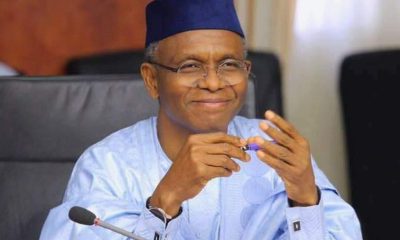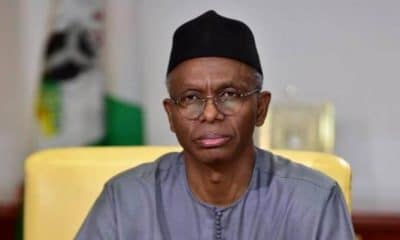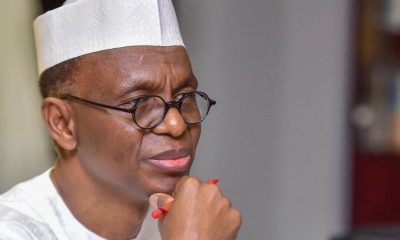OP-ED
If Buhari Is Really Serious…

By Niyi Adedokun
If President MuhammaduBuhari truly desires to leave Nigeria much better than he met it, he would need to get more hands-on and visionary as he takes office for a second term in six days’ time.
It is sad to say that there are ominous signs that things may not be significantly different but as Emily Dickson says in the poem, “Hope is the thing with feathers,” hope perches on the soul of the living, singing songs that inspire Nigerians to aspire for better days. But a lot of what happens will depend on how President Buhari handles the first 100 of days of his new term in office from May 29.
A major determinant of where Nigeria would be headed in the next four years is the first few appointments that Buhari makes in the hours immediately after his inauguration on Wednesday. Hopefully, the country will not be waiting days on end to know the next Chief of Staff to the President and Secretary to the Government of the Federation given the critical roles that these ones play in giving direction to government.
Nigerians are also full of hope that the President will not wait for six months before naming a cabinet to till the ground with him over the next four years; that he will find the grace to discard the largely unproductive collection of humans he had indulged in his cabinet these past years and inject fresh blood capable of breeding life and making sense out of the rhetoric of change he has sold to the country for four years. Four years on, the President must have realised that a man cannot go beyond the quality of his company and would do well for himself and the country by engaging new company that can help him sharpen his vision and execute policies and programmes with dispatch.
The President and his party, the All Progressives Congress, do not seem to have learnt much from the fiasco that the scramble for leadership in the 8thNational Assembly imposed on the state and that is unfortunate. If they did, they would avoid the blatant insistence on the candidacy of just one of those who have legitimately aspired for offices in the two chambers of the National Assembly without little room for consultation.
Of course, by hook or by crook, the candidates of the party are likely to emerge and that is where President Buhari needs the most wisdom. When it happens, he must wean himself of that superiority complex, which bred the aloofness that dug the wide gulf between him and members of the 8th National Assembly. A frosty relationship that was both ill-advised and avoidable but central to the largely undistinguished performance of the administration in the first term that ends on May 29.
It is doubtful that the President and his handlers have come to terms with how much they failed in the task of harnessing the resources within the grasp of the APC in 2015. A little over one week ago, Buhari, while addressing legislators-elect on the platform of his party, acknowledged the unhealthy relationship that existed between his executive and the outgoing National Assembly quite alright, but he habitually painted the picture that all the fault belongs to the other party. That is not just totally wrong but indicative of the type of self-introspection that would see him provide leadership needed for the next four years.
In an article published on this column on September 3, 2015, I had admonished as follows:
“Another reason why the first 100 days is important is the belief that the President is able to have a good hold of the legislature within this period as altercations between both arms of government are common and usually become an impediment to the delivery of good governance. Second, in environments like ours where scheming for elections four years down the line starts in earnest after the conclusion of one, politicians do not have the luxury of time to go slow and steady. Unfortunately, this administration has not even started on that front. It has lost every opportunity to consummate a healthy relationship with the National Assembly, which is ironically led by the same APC!”
This counsel is still expedient today. In essence, no matter how the elections of principal officers for the National Assembly ends, the President must move like a statesman, bury every jot of self-righteous ego and rally everyone round to work for the country.
The President must also address the frightening state of education in Nigeria frontally. When he was asked about plans to revamp primary education during one of the debates preceding the last elections, he conveniently situated the responsibilities for primary education and secondary education in the local and state governments respectively. Of course, his position which was based on the provisions of the 1999 Constitution and Nigeria’s federal structure is correct, but this country is in an emergency currently and extraordinary steps are needed to forestall the dangers ahead.
With between 10.5 and 13 million Nigerian children are out of school, Nigeria runs the risk of breeding a whole generation of unlettered and uncultured people who are sure to unleash unprecedented anger on the country in future. Such evil will surpass any of the insurgency, kidnapping and other violent crimes that the country currently grapples with. And when that happens, it would rubbish any claim that the Buhari administration may lay to performance. The President must realise that the future of this country is not only in the building of infrastructure or the recovery of billions of dollars from those who have cheated the country. On the contrary, it is the proper education and preparation of the Nigerian child for the challenges that the future has in stock.
The same argument goes for health care delivery. To start with, the President must repent of his penchant for medical tourism and lead a revolution for the revamp of the country’s health sector. Members of his current cabinet from the Minister of Health, Isaac Adewole, to the Minister of Labour and Employment, Chris Ngige, have displayed such abominable emotions like lack of will to perform and selective ignorance in the past four years that the President cannot continue to condone.
So, what does one expect of President Buhari on the education and health fronts?
First, the appointment of honest and conscientious professionals to lead these two ministries. Second, the galvanisation of a national action on these fronts. Just like the education of a citizenry impacts one way or the other on the future of nations, their state of health impacts on the national productivity. The new Federal Government must therefore creatively utilise all possible platforms to ensure that Nigeria increases its capacity to deliver to its citizens.
The country must address the gap in the education of its children and that is not just by the elaborate school feeding programme that this administration prides itself with. There is a need to review the national curriculum to produce employable young people as there is also need to improve the training and welfare of teachers.
As the National Health Council meets to ensure that the federation is one in the implementation of policies that would democratise access to quality healthcare, the President must deploy political initiatives that would encourage governors to prioritise these very important areas.
Most importantly, President Buhari must be a father to all Nigerians. That “I belong to everybody and I belong to nobody” soundbite Nigerians got from him in 2015 must now be seen rather than just said. He must give every Nigerian a sense of belonging in words and indeed. Regardless of what the government achieves in all other sectors, national integration, which can be established by the President’s conduct, is fundamental to the development of the country. The level of ethnic distrust, violence, hunger and despair across the country currently gives the Buhari administration a unique opportunity to redeem itself. My prayer is that the President finds the courage to do right by Nigeria, if only for the sake of his own legacy.
Adedokun tweets @niranadedokun










